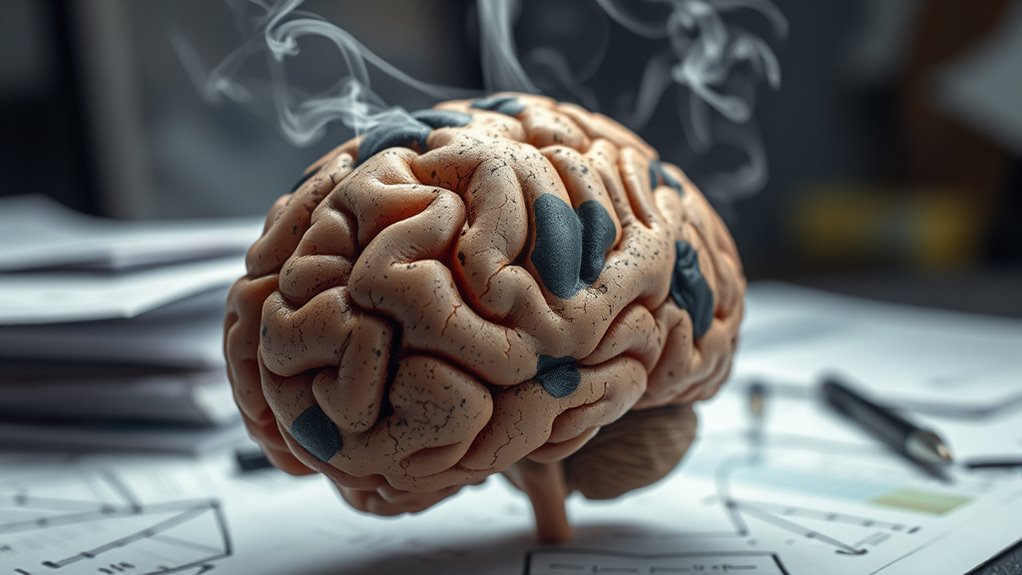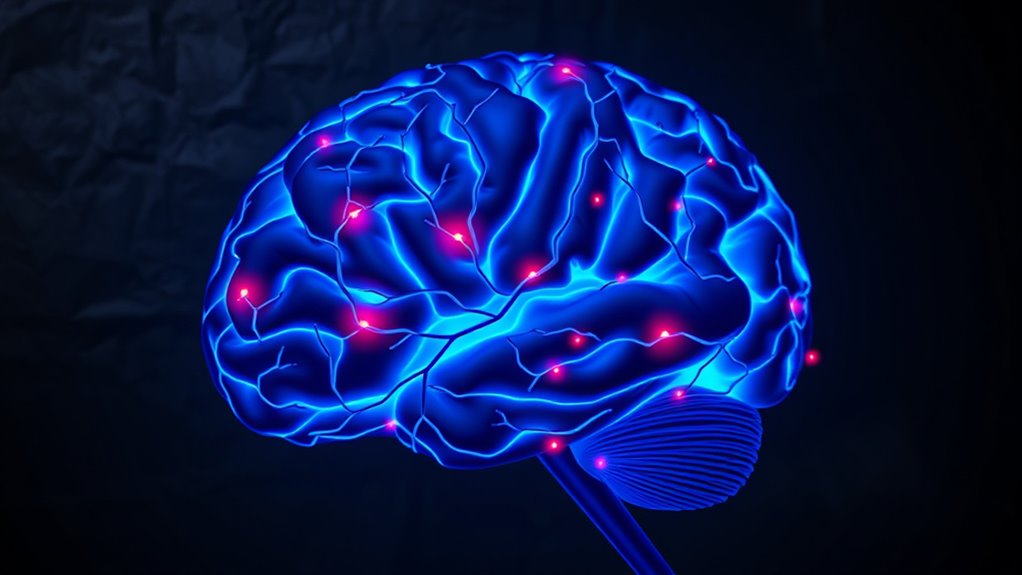Chronic stress can silently damage your brain, reducing activity in key areas like the prefrontal cortex and hippocampus, which affects decision-making, memory, and planning. Elevated stress releases cortisol, which if prolonged, causes structural changes and neuron loss, accelerating cognitive decline. Factors like age and social support influence how stress impacts you, making some more vulnerable. To understand how stress worsens mental health and discover ways to protect your brain, explore the details below.
Key Takeaways
- Chronic stress damages brain regions like the hippocampus and prefrontal cortex, impairing memory and decision-making.
- Elevated cortisol from stress activates neurotoxic pathways, accelerating brain atrophy and neurodegenerative diseases.
- Stress perception and social factors influence hormonal and immune responses, increasing cognitive decline risk.
- Structural brain changes due to stress, such as hippocampal volume reduction, impair neuroplasticity essential for cognition.
- Stress management techniques and social support promote resilience, reducing the impact of stress on cognitive health.
How Chronic Stress Impacts Brain Function

Chronic stress actively rewires your brain by affecting key regions responsible for higher-order thinking and emotional regulation. It reduces activity in the prefrontal cortex, impairing decision-making, planning, and self-control. Meanwhile, the amygdala becomes hyperactive, heightening your emotional responses and survival instincts. This shift causes your brain to prioritize immediate threats over complex reasoning. Over time, stress creates neurotoxic effects that damage areas involved in memory and emotion, weakening their functions. Your brain adapts by strengthening survival pathways but at the expense of cognitive abilities. Additionally, ongoing stress can lead to brain atrophy, further diminishing mental capacity. Research indicates that prolonged stress can even influence dog names and other aspects of behavior, highlighting how pervasive its effects can be. Long-term, these changes alter brain structure and function, making you more susceptible to mental health issues. Fundamentally, chronic stress forces your brain to focus on survival, diminishing your capacity for clear thinking, emotional stability, and learning. Moreover, understanding how stress hormones impact neural pathways can help in developing strategies to mitigate these adverse effects, including neuroplasticity.
The Role of Glucocorticoids and Receptors in Cognitive Decline

You should understand that glucocorticoid receptor activation directly influences cognitive functions, especially memory and executive tasks. When these receptors degrade or become less responsive, it can lead to persistent brain changes and worsening cognition. Recognizing how receptor dynamics affect your brain helps clarify the mechanisms behind stress-related cognitive decline.
Glucocorticoid Receptor Activation
Glucocorticoid receptor activation plays a central role in how stress influences cognitive decline by regulating key neural processes. When activated, these receptors modulate glutamate neurotransmission, calcium signaling, and brain-derived neurotrophic factor pathways, affecting memory and learning. They influence brain regions like the hippocampus and pre-frontal cortex, which are vital for cognition. Activation occurs through both genomic and non-genomic mechanisms, impacting neural plasticity and synaptic function. Disrupted receptor activity, due to factors like disease duration or circadian rhythm disturbances, increases the risk of cognitive impairment. Excessive or unbalanced activation can contribute to diseases such as Alzheimer’s, depression, and Parkinson’s. Proper receptor signaling supports neuroplasticity and cognitive health, while dysregulation can accelerate decline and structural brain changes.
Receptor Degradation Effects
Prolonged activation of glucocorticoid receptors (GRs) by excessive hormone levels triggers their downregulation and degradation, which considerably impacts brain health. When GRs degrade, your brain experiences structural changes, especially in the hippocampus and prefrontal cortex, leading to impaired synaptic plasticity. This receptor loss disrupts the balance between mineralocorticoid and glucocorticoid receptors, both essential for regulating cognitive functions like memory and decision-making. Since receptor degradation isn’t fully reversible, long-term stress can cause persistent dysfunction, reducing your brain’s resilience and repair capabilities. This ongoing receptor loss also accelerates neurodegenerative processes, increasing your risk for conditions like Alzheimer’s disease. Managing glucocorticoid levels and preventing receptor degradation could be key to protecting cognitive health against stress-related decline. Additionally, understanding the role of receptor regulation can help in developing strategies to mitigate these effects. Research into stress management techniques highlights potential avenues for preserving receptor function and promoting brain health over time.
Age-Related Vulnerability to Stress-Related Cognitive Changes

As people age, their brains become more vulnerable to the effects of stress, which can accelerate cognitive decline. Older adults face increased risks from stress due to structural and functional brain changes. Here are four key points:
- Elevated perceived stress raises your risk of cognitive impairment, with studies showing a 1.37 times higher likelihood. Research indicates that chronic stress can lead to measurable changes in brain volume and connectivity.
- Your brain’s natural aging process makes it more sensitive to stress hormones like cortisol, especially in men. This increased sensitivity can lead to more pronounced effects of stress on brain health. Recognizing the brain’s plasticity can help in developing targeted interventions.
- Stress affects memory differently in older adults, sometimes even improving working memory but impairing other functions.
- Gender differences matter: middle-aged women experiencing stress may face more significant memory decline later in life.
- Recognizing the impact of stress on aging can help in developing strategies to maintain cognitive health as you grow older. Understanding the role of brain plasticity can also aid in resilience-building efforts.
- Incorporating stress management techniques like mindfulness and meditation can help mitigate these effects and support healthy brain aging.
Understanding these vulnerabilities helps you recognize the importance of managing stress as you age to preserve cognitive health.
The Influence of Social Factors and Personal Perception

Your social environment and how you perceive stress considerably influence cognitive health. When social support weakens or daily encounters feel stressful, your risk of cognitive decline rises. Recognizing and managing these social factors can make a real difference in maintaining your cognitive function over time. Developing emotional CQ can enhance your ability to manage stress and improve social interactions, thereby supporting cognitive health. Incorporating mindfulness techniques such as deep breathing exercises or visualization can further strengthen emotional resilience and stress management, promoting better cognitive outcomes. Building resilience through ongoing social engagement and emotional development is essential for long-term cognitive well-being. Utilizing sound design techniques like ambient sounds or calming audio can also aid in reducing stress levels and fostering emotional stability.
Social Support Mitigation
Have you ever considered how social factors and personal perceptions shape your cognitive resilience? Social support plays a key role in protecting your brain, especially emotional support, which is linked to better cognitive outcomes. Here’s how it helps:
- It reduces stress, preventing negative effects on your thinking and memory.
- It boosts psychological well-being, keeping your mind sharp.
- Engaging with others stimulates cognitive activity, supporting mental agility.
- Strong networks can help you stay resilient against diseases like Alzheimer’s.
- Understanding city dynamics and local resources, such as community centers and social groups, can enhance your social integration.
Research shows that older adults with low social support face higher risks of cognitive decline. Women and vulnerable groups benefit most from emotional support interventions. Building meaningful connections isn’t just good for your heart—it’s essential for your mind. Additionally, recognizing the importance of electric bikes and generators in promoting sustainable living can foster a sense of community and shared purpose, further strengthening social bonds. Moreover, fostering diversification strategies can help individuals navigate economic uncertainties and support mental resilience. Incorporating self-cleaning features in home devices can also reduce household stress and promote a cleaner, healthier environment, contributing indirectly to cognitive health.
Furthermore, understanding the role of nutrient retention in raw foods can guide dietary choices that support brain health.
Perceived Stress Impact
Perceived stress markedly influences cognitive health, with higher stress levels linked to faster declines in memory, reasoning, and spatial skills. When you perceive stress as overwhelming, it can accelerate cognitive impairment, affecting both memory and problem-solving abilities. This impact is evident across racial groups and regardless of age or socioeconomic status. Elevated perceived stress triggers hormonal changes, inflammation, and immune dysfunction, which contribute to brain aging. It also increases the risk of psychiatric symptoms, sleep issues, and unhealthy behaviors like smoking or inactivity. Recognizing how personal perception of stress affects your brain is essential. Stress perception can alter physiological responses that impact cognitive functions. Managing stress through social support, coping strategies, and lifestyle changes can help mitigate these effects. Additionally, understanding headphone compatibility and ensuring proper device setup can reduce stress caused by technical frustrations, supporting overall mental well-being. Engaging in creative practice activities can serve as effective stress relievers, promoting mental resilience. Incorporating stress-reducing activities such as mindfulness, exercise, or aromatherapy—using essential oils like lavender or peppermint—can further enhance your ability to manage stress levels effectively. Addressing perceived stress is critical for preserving cognitive health over time. Consistently engaging in stress-reducing activities has been shown to positively influence brain health, helping to slow cognitive decline.
Biological Pathways Linking Stress to Neural Damage

Stress triggers a cascade of biological responses that can lead to neural damage over time. You may not realize it, but your brain’s response to stress involves complex pathways. Here’s what happens:
- The amygdala detects stress, signaling the hypothalamus.
- The hypothalamus activates the HPA axis, releasing glucocorticoids like cortisol.
- CRF influences dendritic remodeling in the hippocampus, affecting memory.
- Neurotransmitters such as norepinephrine and cortisol alter neural activity and connectivity.
Over time, these responses cause structural changes, like dendritic shrinkage and hippocampal volume reduction. Chronic stress also disrupts neuroplasticity and synaptic function, ultimately impairing cognitive abilities and increasing vulnerability to neurodegeneration.
Strategies to Protect Your Brain From Stress-Related Damage

Protecting your brain from stress-related damage involves adopting practical strategies that directly reduce stress levels and support neural health. Engaging in activities like yoga, meditation, massage, or listening to music can lower stress and reduce cognitive decline risk. Incorporating walks in nature or forest bathing offers additional mental health benefits. Aim to practice stress-relieving activities at least 1-2 times weekly for 15-30 minutes to preserve brain function. Establish control over stressful situations by focusing on manageable factors, reducing harmful effects from unpredictability. Maintaining a healthy lifestyle—such as regular exercise, quality sleep, and a balanced diet—also plays an essential role. Creating routines that promote relaxation and mental well-being can considerably counteract chronic stress, safeguarding your cognitive health over time.
Frequently Asked Questions
Can Stress-Induced Cognitive Decline Be Reversed?
You might wonder if stress-induced cognitive decline can be reversed. The good news is, it’s often possible through targeted interventions. Regular exercise, cognitive training, and mindfulness practices can help restore cognitive function by reducing stress and boosting brain resilience. Additionally, social support and stress management techniques strengthen your coping skills. Embracing these strategies can make a real difference in reversing or slowing down cognitive decline caused by stress.
Which Lifestyle Changes Best Reduce Stress-Related Brain Damage?
Ever wonder which lifestyle changes can best reduce stress-related brain damage? You should focus on a balanced diet full of whole grains, fruits, and vegetables to cut inflammation. Regular exercise boosts BDNF and neuroplasticity, protecting your brain. Incorporate stress management techniques like meditation or yoga to lower cortisol levels. Engaging in cognitive activities and maintaining social connections also strengthen your brain’s resilience against stress-induced harm.
How Does Chronic Stress Affect Memory Beyond the PFC?
Chronic stress impacts memory beyond the PFC by damaging key brain regions. It causes dendritic shrinkage in the hippocampus, impairing memory encoding and retrieval. Elevated stress hormones alter neurotransmitter levels, disrupting neural communication. The amygdala becomes hyperactive, enhancing emotional responses but potentially overwhelming memory processes. Over time, these changes reduce neuroplasticity, making it harder for you to learn, remember, and adapt, increasing your risk of cognitive decline.
Are Certain Individuals More Genetically Predisposed to Stress Effects?
Think of your mind as a garden; some seeds are more prone to weeds. Your genetics act like these seeds, making you more or less susceptible to stress’s harmful effects. If you carry variants like APOE ε4 or have a heightened stress response, you’re more vulnerable to cognitive storms. Recognizing this helps you tend your mental garden better, planting resilience and nurturing growth despite life’s turbulence.
What Role Do Diet and Exercise Play in Stress Resilience?
You can boost your stress resilience through diet and exercise. Eating nutrient-rich foods with vitamins and antioxidants protects your brain from oxidative stress, while regular physical activity releases endorphins that lift your mood. By maintaining healthy habits, like choosing whole grains and staying active, you build self-efficacy and improve your ability to handle stress. These lifestyle choices serve as powerful tools to strengthen your mental resilience in everyday life.
Conclusion
If you ignore stress, you’re risking your brain turning into a foggy, forgetful mess faster than you can blink. Chronic stress relentlessly chips away at your memory and thinking skills, making you forget names, dates, and even who you are! Don’t wait until your brain’s a shadow of its former self—take action now. Protect your mind with the strategies that can save you from this silent, unstoppable attack. Your future self will thank you!









